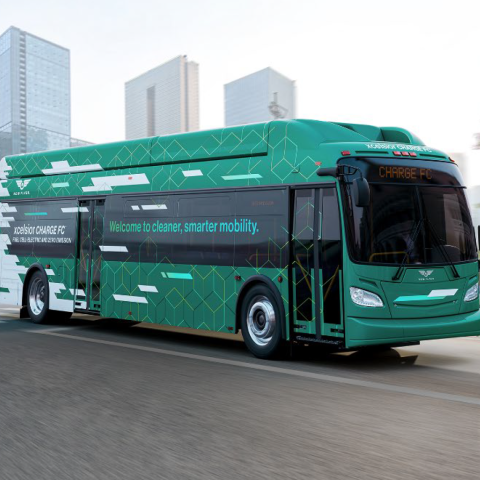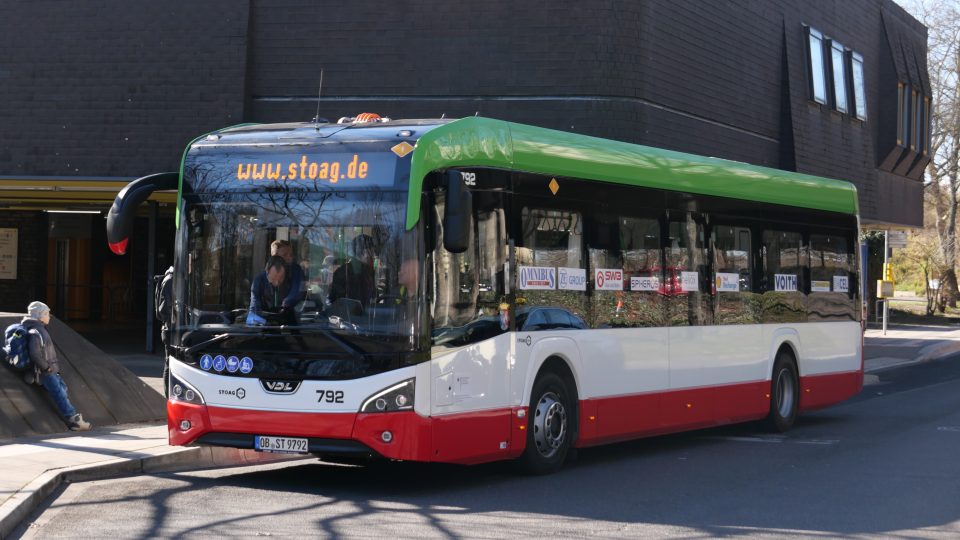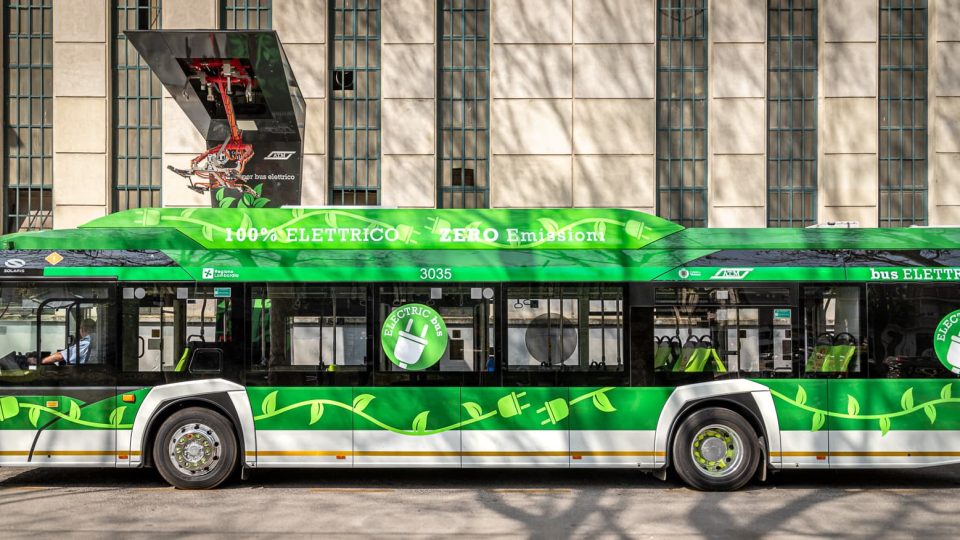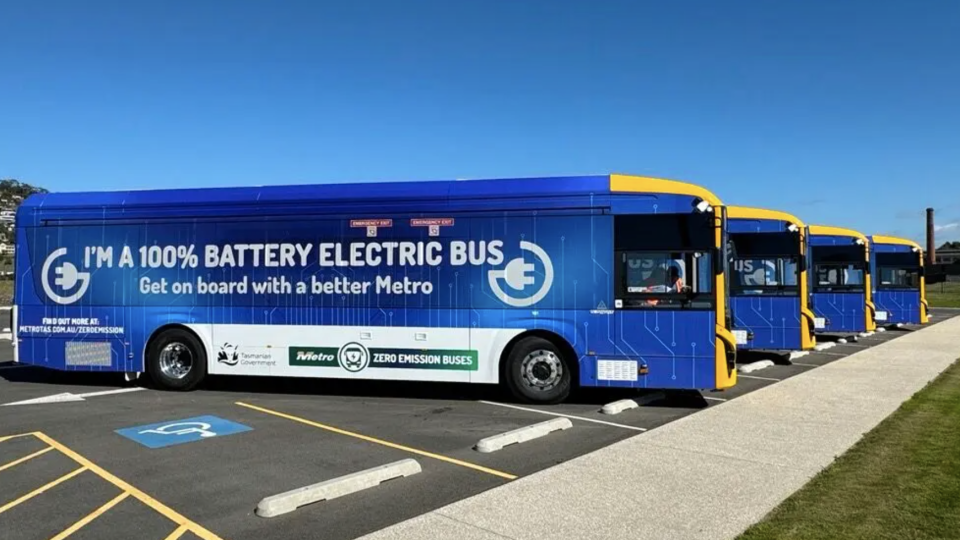New Flyer launches new fuel cell bus model Xcelsior Charge FC (with Ballard technology and Siemens ELFA 3 drivetrain)
New Flyer unveiled today its next generation fuel cell bus model Xcelsior CHARGE FC, with fuel cell module from Ballard Power Systems and Siemens ELFA 3 at the driveline. The model follows the Xcelsior CHARGE H2 (launched in 2019) and is available in 40-foot and 60-foot lengths, and both models meet the Federal Transit Administration Model […]

New Flyer unveiled today its next generation fuel cell bus model Xcelsior CHARGE FC, with fuel cell module from Ballard Power Systems and Siemens ELFA 3 at the driveline. The model follows the Xcelsior CHARGE H2 (launched in 2019) and is available in 40-foot and 60-foot lengths, and both models meet the Federal Transit Administration Model Bus Testing Program at Altoona, Pennsylvania.
California’s GET in late 2021 has ordered 5 fuel cell buses by New Flyer. This order follows a prior (2020) GET bus purchase of five forty-foot fuel cell-electric Xcelsior CHARGE H2 buses. Still il California, New Flyer hydrogen buses have been ordered also by Orange County Transportation Authority (OCTA) and San Francisco Bay Area’s AC Transit.
It uses hydrogen and fuel-cell technology to create electricity and to charge batteries for zero-emission extended-range, saving 85-175 tons of greenhouse gas per year from tailpipe emissions compared to a traditional diesel bus. With a stated range of over 370 miles. The bus can be refueled in 6-20 minutes depending on the model and operating conditions and requires no overnight plug-in electrical re-charging, New Flyer stresses.
New Flyer Xcelsior CHARGE FC unveiled
The bus is built on the Xcelsior platform with over 16,000 buses delivered to date, New Flyer’s battery-electric and fuel cell-electric models have surpassed over 15 million electric vehicle service miles.
The battery packaging, developed by New Flyer, utilizes a waterproof enclosure design that is lighter and easier to maintain, decreasing the number of parts by 90%. What is interesting, still as presented by New Flyer, “streamlined design enables technicians to simply “plug in” or “unplug” individual battery packs, significantly reducing bus downtime and allowing easy replacement”.
New Flyer manufactures its energy storage system enclosures in its bus production facilities. The battery packaging, developed by New Flyer, utilizes a waterproof enclosure design that is lighter and easier to maintain, decreasing the number of parts by 90%. Its streamlined design enables technicians to simply “plug in” or “unplug” individual battery packs, significantly reducing bus downtime and allowing easy replacement.
New Flyer partners with Ballard and Siemens
The new FCmove-HD+ fuel cell power module from Ballard Power Systems introduces a more compact and robust design with lifecycle cost reductions achieved through lower maintenance requirements, higher reliability, and fewer parts. The integrated design houses all subcomponents in a single enclosure; it is smaller, lighter, and uses 50% fewer parts, making it easier to service and maintain. It offers over 97% fuel cell power availability while in service, and a wider operating range across a variety of climates, New Flyer states.
Finally, manufacturer says that the Siemens ELFA 3 traction system delivers up to 90% energy recovery through regenerative braking and weighs 69% less than ELFA 2, delivering a more efficient design through compact inverters and embedded drive controllers.
New Flyer’s Xcelsior CHARGE FC, manufacturer says, “incorporates four distinct technology advancements to deliver a robust, long-range, high-performance hydrogen fuel cell-electric bus, including a lighter, simpler, and more efficient heavy-duty fuel cell power module that is easier to service; recyclable, high-power batteries delivering a longer range of over 370 of miles of highway driving without refueling; a redesigned waterproof (IP 67 and IP 69 rated) battery enclosure providing improved serviceability; and a high-grade, electric drive traction system with up to 90% energy recovery”.
Fuel cell buses for the new mobility era
“The Xcelsior CHARGE FC includes the latest technology innovations. The new streamlined design is easier to service and maintain, delivers longer range at highway speeds, improves energy recovery, and is smart city-capable, making it the most advanced hydrogen fuel cell-electric bus available on the market,” said Chris Stoddart, President, North American Bus and Coach, NFI. “With the Xcelsior CHARGE FC now added to NFI’s market-leading EV and AV vehicle lineup, NFI is undeniably leading a new mobility era, delivering unmatched performance and sustainability benefits to transit operators.”
“More and more cities are making the commitment to 100% zero-emission fleets and Xcelsior CHARGE FC provides an ideal complement to battery-electric buses for agencies wanting to integrate the reliable long-range performance of hydrogen fuel cell-electric buses,” said Jennifer McNeill, Vice President of Public Sector Sales and Marketing, New Flyer and MCI. “The Xcelsior CHARGE FC also advances our effort to continue driving the adoption of zero-emission mobility with a safe, scalable, and streamlined approach to the zero-emission manufacturing process. In turn, we simplify training for our production teams and those of transit agencies across North America to continue supporting reskilling, upskilling, and workforce development to ensure successful zero-emission deployments.”







